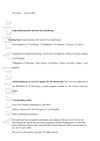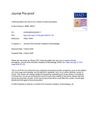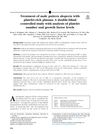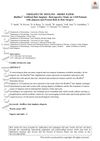 7 citations,
April 2020 in “Dermatologic Therapy”
7 citations,
April 2020 in “Dermatologic Therapy” Dexpanthenol improves hair growth in male baldness.
1 citations,
March 2021 in “F1000Research” Plant-based compounds might be effective, low-side-effect treatments for prostate cancer by blocking a specific enzyme.
 1 citations,
January 2020 in “Skin appendage disorders”
1 citations,
January 2020 in “Skin appendage disorders” Hair transplants for male baldness can show inflammation and fibrosis, but more research is needed to confirm LPP presence.

Arabica coffee pulp extract may help prevent hair loss and promote hair growth.
 December 2015 in “Вестник дерматологии и венерологии”
December 2015 in “Вестник дерматологии и венерологии” Men with male pattern baldness may not have different hormone levels, but their hair follicles are likely more sensitive to hormones.
 10 citations,
March 2007 in “Dermatology”
10 citations,
March 2007 in “Dermatology” Sex-determining genes may affect male baldness.
 6 citations,
November 2017 in “Journal of the European Academy of Dermatology and Venereology”
6 citations,
November 2017 in “Journal of the European Academy of Dermatology and Venereology” A woman got melanoma on her scalp after anti-hair loss treatment with injections.
 4 citations,
May 2020 in “Journal of The American Academy of Dermatology”
4 citations,
May 2020 in “Journal of The American Academy of Dermatology” Cicatricial pattern hair loss is likely advanced common baldness, not a type of lichen planopilaris.
 76 citations,
February 2021 in “International Journal of Molecular Sciences”
76 citations,
February 2021 in “International Journal of Molecular Sciences” Mesenchymal stem cells show potential for skin healing and anti-aging, but more research is needed for safe use, especially regarding stem cells from induced pluripotent sources.
 47 citations,
April 2003 in “Journal of dermatological science”
47 citations,
April 2003 in “Journal of dermatological science” Thujae occidentalis semen extract may help treat male pattern baldness by blocking a hair loss-related enzyme and reducing hair loss in mice.
 8 citations,
June 2019 in “Scientific Reports”
8 citations,
June 2019 in “Scientific Reports” Increased PPARGC1α relates to hair thinning in common baldness.
 57 citations,
October 2018 in “Journal of The American Academy of Dermatology”
57 citations,
October 2018 in “Journal of The American Academy of Dermatology” Platelet-rich plasma treatment can significantly increase hair count and density in men with pattern baldness, and these improvements can last up to 3 months.
 49 citations,
April 2012 in “Phytotherapy Research”
49 citations,
April 2012 in “Phytotherapy Research” Rosemary leaf extract may be an effective natural treatment for hair growth and male pattern baldness.
 21 citations,
November 2017 in “Scientific Reports”
21 citations,
November 2017 in “Scientific Reports” Different human hair follicle stem cells grow at different rates and respond differently to a baldness-related compound.
 7 citations,
July 2022 in “Pharmaceuticals”
7 citations,
July 2022 in “Pharmaceuticals” Pumpkin Seed Oil in niosomes may help treat hair loss and improve hair growth.
 January 2008 in “Annals of Nutrition and Metabolism”
January 2008 in “Annals of Nutrition and Metabolism” Parthenolide promotes hair growth in mice and may influence pathways related to male pattern baldness.
 October 1961 in “Archives of Dermatology”
October 1961 in “Archives of Dermatology” Reassurance is important for postpartum hair shedding as it likely won't cause complete baldness.
 78 citations,
September 2008 in “International Journal of Cosmetic Science”
78 citations,
September 2008 in “International Journal of Cosmetic Science” The document concludes that various clinical methods are used to assess ageing skin and the effectiveness of anti-ageing products.
 18 citations,
January 2002 in “Chemical & pharmaceutical bulletin/Chemical and pharmaceutical bulletin”
18 citations,
January 2002 in “Chemical & pharmaceutical bulletin/Chemical and pharmaceutical bulletin” New pregnane derivatives were more effective than finasteride at inhibiting a key enzyme for male pattern baldness.
 17 citations,
April 2021 in “Molecules/Molecules online/Molecules annual”
17 citations,
April 2021 in “Molecules/Molecules online/Molecules annual” Linoleic acid from Malva verticillata seeds may help treat hair loss by promoting hair cell growth and blocking baldness signals.
 3 citations,
June 2019 in “Dermatologic Therapy”
3 citations,
June 2019 in “Dermatologic Therapy” Biofibre hair implant is a safe, effective treatment for baldness with 95% patient satisfaction.
 49 citations,
October 2017 in “Nutrients”
49 citations,
October 2017 in “Nutrients” Equisetum debile extract, especially the ethyl acetate type, may be a promising natural ingredient for anti-hair loss products.
 42 citations,
June 2009 in “Journal of Cosmetic Dermatology”
42 citations,
June 2009 in “Journal of Cosmetic Dermatology” Hair loss in males involves inflammation, collagen buildup, and follicle damage, with severity increasing with age and baldness duration.
 33 citations,
August 2013 in “Journal of Investigative Dermatology”
33 citations,
August 2013 in “Journal of Investigative Dermatology” Human hair follicle stem cells show signs of low oxygen levels, which may be important for hair growth and preventing baldness.
 14 citations,
April 2021 in “Biology”
14 citations,
April 2021 in “Biology” Thai rice bran extracts, especially from Tubtim Chumphae rice, can significantly reduce the activity of hair loss genes, with x-tocopherol showing potential as an anti-hair loss product.
 10 citations,
November 1997 in “British Journal of Dermatology”
10 citations,
November 1997 in “British Journal of Dermatology” RU58841 significantly increases hair growth rate and initiates more hair cycles, but doesn't affect hair thickness, suggesting it could be a new treatment for baldness.
 1 citations,
June 2020 in “Dermatologic Therapy”
1 citations,
June 2020 in “Dermatologic Therapy” COVID-19 can cause various skin issues, including rashes and 'COVID toes', and may worsen autoimmune diseases or affect men with baldness more severely.
 1 citations,
January 2015 in “Journal of Aesthetic & Reconstructive Surgery”
1 citations,
January 2015 in “Journal of Aesthetic & Reconstructive Surgery” Hair transplantation is the best treatment for hair loss, with new technologies improving results, and stem cell and gene therapies may treat severe baldness in the future.
 September 2009 in “European Urology Supplements”
September 2009 in “European Urology Supplements” After prostate removal surgery, higher initial prostate size was linked to higher urethral PSA levels and more severe male pattern baldness.
 30 citations,
December 2017 in “Medical Hypotheses”
30 citations,
December 2017 in “Medical Hypotheses” The model suggests that scalp tension could lead to hair loss, with factors like blood vessel hardening, enlarged oil glands, and poor microcirculation also playing a role. It also hints at a possible link between skull shape and baldness pattern.





























